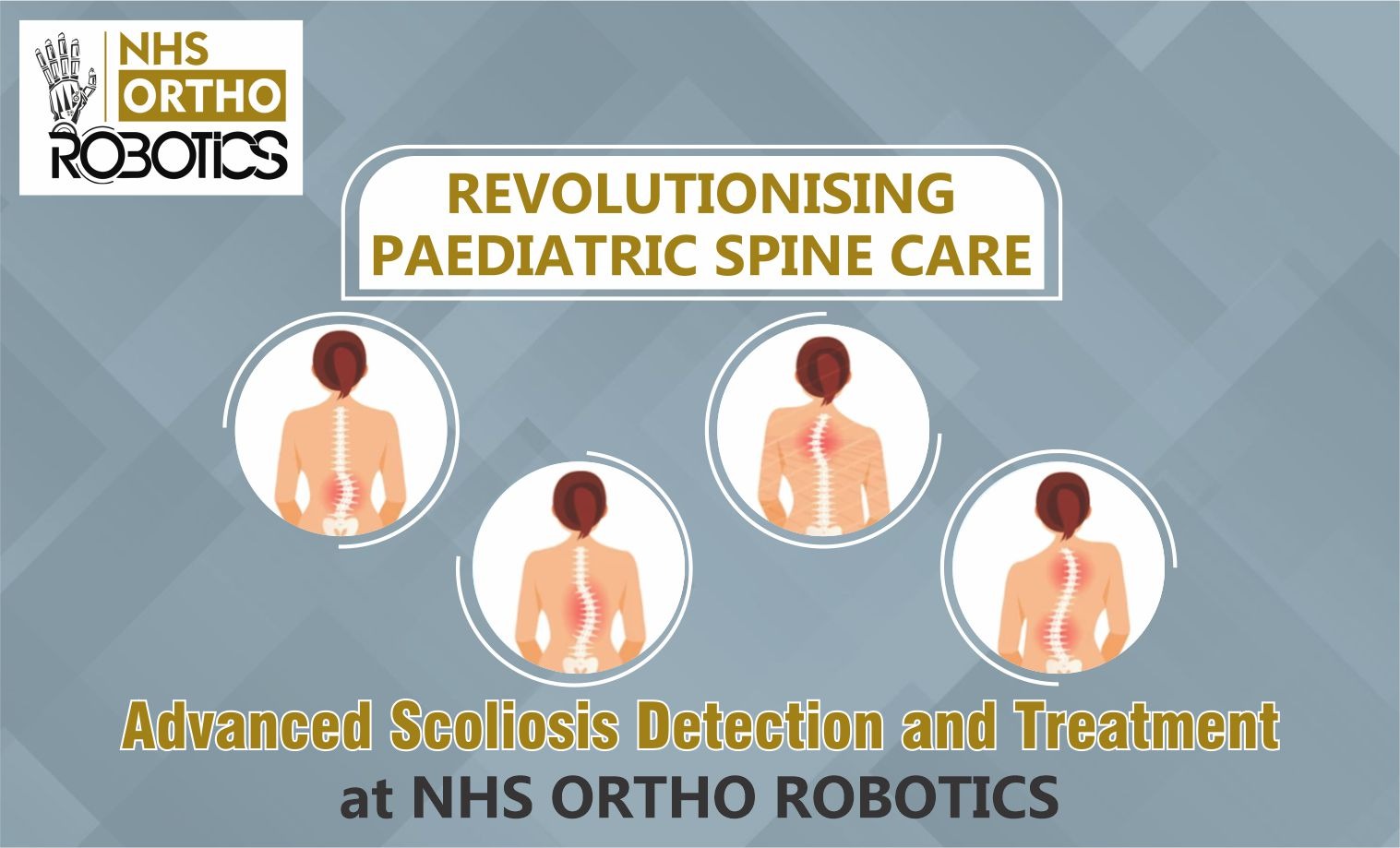
Revolutionising Spine Care: Advanced Scoliosis Detection and Treatment at NHS Ortho Robotics
Scoliosis — a sideways curvature of the spine — is a condition that can affect anyone, from young children to adults. While mild cases often go unnoticed, severe curvature can lead to pain, postural deformities, and even breathing difficulties. The key to managing scoliosis lies in early detection, accurate diagnosis, and precise treatment. At NHS Ortho Robotics (a unit of NHS Hospital), patients receive world-class scoliosis care guided by the expertise of Dr Shubhang Aggarwal (Director and Senior Orthopaedic Surgeon) and Dr Saransh Gupta (Scoliosis Surgeon).
Understanding Scoliosis
Scoliosis is characterised by an abnormal lateral curvature of the spine, often shaped like an ‘S’ or ‘C’. It may occur due to congenital factors, neuromuscular conditions, or idiopathic causes (where the reason remains unknown). While mild curves may only require monitoring, progressive or severe scoliosis demands medical intervention.
The most common symptoms include uneven shoulders, an asymmetrical waist, one hip higher than the other, and in some cases, back pain. When left untreated, scoliosis can worsen with growth and impact lung and heart function.
Early Detection: The Foundation of Effective Treatment
At NHS Hospital, early detection is prioritised through comprehensive screening and diagnostic techniques. The orthopaedic team uses state-of-the-art imaging systems to assess spinal curvature with unmatched accuracy. Routine school screenings and physical assessments are encouraged to identify spinal deformities early, particularly in adolescents where rapid growth can accelerate the curve.
The hospital’s advance and cutting-edge technology plays a crucial role in diagnosing even subtle spinal deviations. 3D spine imaging, robotic assessments, and posture analysis tools provide detailed visualisation of the spine, ensuring that no abnormality is overlooked.
Expertise that Defines Excellence
The strength of scoliosis management at NHS Ortho Robotics lies in its expert team. Dr Shubhang Aggarwal (Director and Senior Orthopaedic Surgeon), renowned for his precision and patient-centric approach, leads the department with over two decades of surgical excellence. Working alongside him, Dr Saransh Gupta (Scoliosis Surgeon) specialises in complex spine deformity corrections, bringing advanced surgical techniques and deep clinical insight into every case.
Together with a team of five orthopaedic surgeons, they ensure that each patient benefits from collective expertise, multidisciplinary planning, and comprehensive post-operative care. This team-based approach makes NHS Hospital the best centre for scoliosis management in the region.
Advanced and Robotic Technology in Scoliosis Surgery
Scoliosis surgery requires precision, balance, and careful planning — aspects where robotics have completely transformed outcomes. The NHS Ortho Robotics unit is equipped with cutting-edge robotic systems that assist surgeons in planning the exact correction angle, optimising screw placement, and ensuring minimal tissue disruption.
Robotic-assisted spine surgery offers several benefits:
- Unmatched Accuracy: Robotic navigation ensures precise alignment and fixation.
- Minimally Invasive: Smaller incisions mean less pain, reduced blood loss, and faster recovery.
- Enhanced Safety: Real-time feedback minimises the risk of human error.
- Quicker Rehabilitation: Patients regain mobility sooner with shorter hospital stays.
These technologies ensure that patients not only recover faster but also experience improved spinal alignment and cosmetic outcomes.
Personalised Treatment for Every Patient
No two scoliosis cases are alike, and NHS Hospital follows a fully personalised approach. For mild scoliosis, non-surgical management such as custom bracing, physiotherapy, and posture correction exercises are recommended. In moderate to severe cases, surgical correction is carefully planned using digital spine mapping and robotic assistance.
Throughout the treatment journey, the patient and their family remain fully informed. Preoperative counselling, detailed visual simulations, and post-surgery physiotherapy are integral parts of the care process.
Holistic Care Beyond Surgery
Scoliosis care does not end in the operating theatre. The rehabilitation team at NHS Ortho Robotics focuses on post-surgery physiotherapy, muscle strengthening, and posture correction. Regular follow-ups ensure that the spine remains aligned and that patients regain full confidence in their mobility.
Moreover, the hospital’s supportive ecosystem — from advanced recovery rooms to a dedicated orthopaedic care team — ensures comfort and safety at every stage.
Why Choose NHS Ortho Robotics?
- Led by Experts: Under Dr Shubhang Aggarwal and Dr Saransh Gupta, scoliosis treatment combines medical mastery with compassionate care.
- 5 Orthopaedic Surgeons Team: A multidisciplinary team ensuring comprehensive management.
- Cutting-edge Robotic Systems: Precision and safety in every procedure.
- Personalised Patient Care: Tailored treatment plans for every individual.
- Trusted Legacy: NHS Hospital stands as the best centre for orthopaedic and spine care in North India.
Conclusion
Scoliosis can be life-altering, but with the right expertise and technology, it can be effectively managed — restoring not just posture but confidence and quality of life. At NHS Ortho Robotics (a unit of NHS Hospital), the integration of human expertise and robotic precision has set new benchmarks in spine care.
Guided by Dr Shubhang Aggarwal (Director and Senior Orthopaedic Surgeon) and Dr Saransh Gupta (Scoliosis Surgeon), the centre continues to lead the way in scoliosis detection, correction, and rehabilitation — reaffirming its reputation as the best centre for advanced orthopaedic care.
